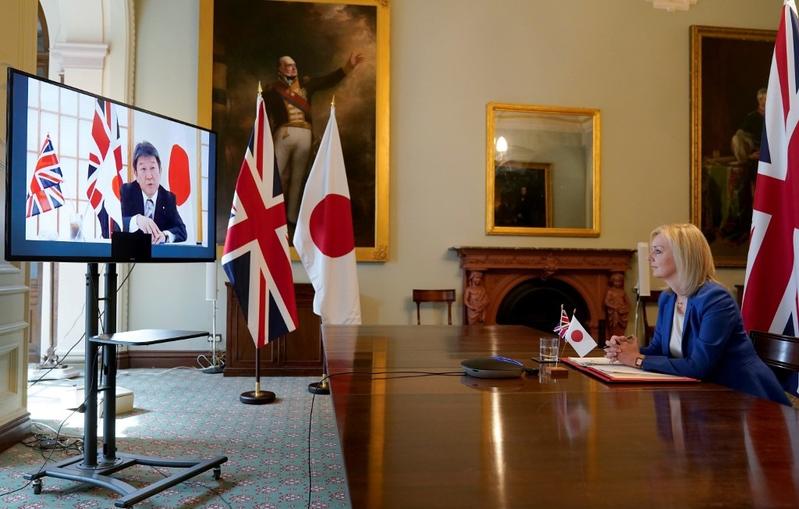 A handout image released by 10 Downing Street, shows Britain's International Trade Secretary Liz Truss (right) during a video conference call with Japan's Foreign Minister Toshimitsu Motegi, as they formally begin negotiations on a free trade agreement, at the Department for International Trade in London on June 9, 2020. (ANDREW PARSONS / 10 DOWNING STREET / AFP)
A handout image released by 10 Downing Street, shows Britain's International Trade Secretary Liz Truss (right) during a video conference call with Japan's Foreign Minister Toshimitsu Motegi, as they formally begin negotiations on a free trade agreement, at the Department for International Trade in London on June 9, 2020. (ANDREW PARSONS / 10 DOWNING STREET / AFP)
The United Kingdom's hopes of securing its first independent trade deal in more than four decades have hit a major stumbling block, after negotiations with Japan ground to a halt over the issue of blue cheese.
Japan is reportedly willing to get rid of tariffs on hard cheeses by 2033, but is refusing to give soft cheese the same terms
Japanese Foreign Minister Toshimitsu Motegi was in London last week for talks with Secretary of State for International Trade Liz Truss, and the two sides were reported to have reached a "substantial" preliminary agreement, raising hopes of an imminent deal.
But Truss's insistence on the inclusion of the distinctive blue-veined Stilton cheese in agreement discussions threatens to scupper a deal covering sectors including financial services.
ALSO READ: Surge in UK redundancies revealed
Truss's parliamentary constituency of South West Norfolk has a major agricultural sector and at the 2014 Conservative Party conference, she made a memorable speech where she said the fact Britain imported two-thirds of its cheese was "a disgrace". But her enthusiasm for British cheese could now be problematic.
Japan is reportedly willing to get rid of tariffs on hard cheeses by 2033, but is refusing to give soft cheese the same terms. The Nikkei Asian Review business newspaper said that British farmers are desperate for the government to have Stilton treated as a special case because of their fears of the impact of losing European Union subsidies once Britain's transition period out of the EU is complete at the end of the year.
Huge contract with EU
Last year, Japan signed a huge trade deal with the EU that is being used as the model for any agreement with the UK, but considering the vastly reduced size of the market in comparison, Japan is unwilling to offer such good terms.
David Henig, director of the UK Trade Policy Project, has already said any potential deal is "not phenomenal, but at least both sides want to do it".
The Department of Trade has said it would result in a 21 percent increase in British exports to Japan, but a 79 percent rise in Japanese exports to the UK. It long-term benefit would be a 0.07 percent increase to the UK's GDP, as opposed to the 5 percent loss in GDP forecast during the next 15 years as a result of the UK leaving the EU's single market and customs union, the department said.
READ MORE: UK seeks to smooth post-Brexit North Ireland trade disruption
The lack of progress in negotiations between the EU and the UK, plus the abandonment of hope of securing a trade deal with the United States before its elections in November, has pushed any possible deal with Japan to the top of the UK's agenda.
Last year, Britain sold 18 million pounds (US$23.5 million) worth of blue cheese worldwide, most of it Stilton, according to figures from the Agriculture and Horticulture Development Board. But little more than 100,000 pounds of that was sold to Japan, with a milder version having been prepared especially for local tastes.


